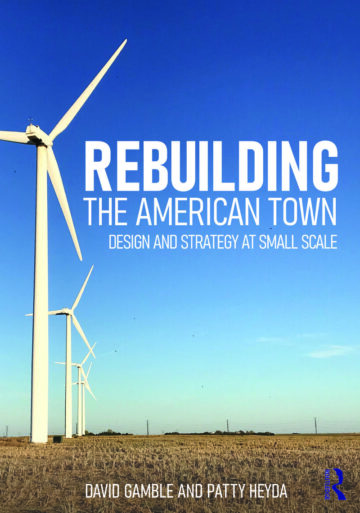In the scholarship of urbanism, small towns are overlooked and understudied. Rebuilding the American Town highlights how smaller municipalities are transforming to serve their communities and meet the future. The book uncovers creative planning and design strategies of nine U.S. towns as they rebuild to remain vibrant, equitable and viable in the face of metropolitan sprawl, population shifts, political division, economic shortfalls and climate change. Rebuilding the American Town includes interviews and insights from those directly involved, to reveal the challenges and advantages of being a smaller city while highlighting the power of design at local levels.
The book provides a new lens for contemporary urbanism more broadly as it shifts thinking away from large-metro concerns, toward novel, tactical strategies that advance the quality of life for residents through design and policies that are scaled to the populations and places they serve. The projects in this book show how the small town in the United States is unexpectedly progressive, experimental, urban and global.
Reviews
“Rebuilding the American Town is a love letter to our small cities and towns and confirms that spectacular urban design and planning outcomes can be found in the most unlikely places.” Maurice Cox, Professor, former commissioner of the Chicago Department of Planning and Development and Detroit Department of Planning, and former mayor of Charlottesville, Virginia
“This book brings new attention to the American town in a way that fundamentally reshapes how we think about community and progress in the 21st century.” Shaun Donovan, U.S. Secretary of Housing and Urban Development (2009–2014); CEO and president, Enterprise Community Partners
“The well-documented case studies in this timely book will be a useful resource for years to come to everyone interested in helping small towns leverage local conditions to address challenges ranging from justice and climate change to depopulation and gentrification.” Ellen Dunham-Jones, professor of urban design, Georgia Institute of Technology and co-author of Retrofitting Suburbia
“Americans tend to sentimentalize small towns in memory while having largely abandoned them for the lures of the metropolis. Patty Heyda and David Gamble present a prescient counterpoint, revealing the urbanity, entrepreneurship, community and fulfilling lives found in modest sized settlements across the country.” Alex Krieger, professor emeritus of urban planning and design, Harvard University, and author of City on a Hill: Urban Idealism in America from the Puritans to the Present
About the authors
David Gamble is lecturer in urban design at the Massachusetts Institute of Technology. He is a registered architect and certified urban planner and principal of Gamble Associates, based in Cambridge. The practice focuses on urban revitalization and community development. He is the co-author of Rebuilding the American City and editor of Idea City.
Patty Heyda is professor of urban design and architecture in the Sam Fox School of Design & Visual Arts at Washington University in St. Louis. She researches American cities and design politics, with a focus on mapping and spatial justice. She is the author of Radical Atlas of Ferguson, USA and co-author of Rebuilding the American City.
